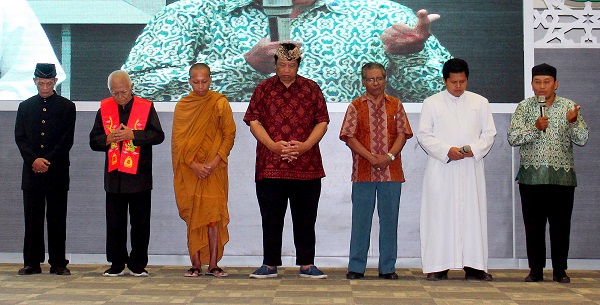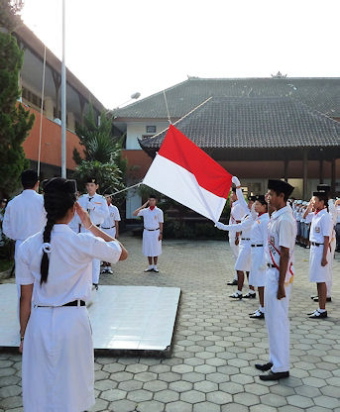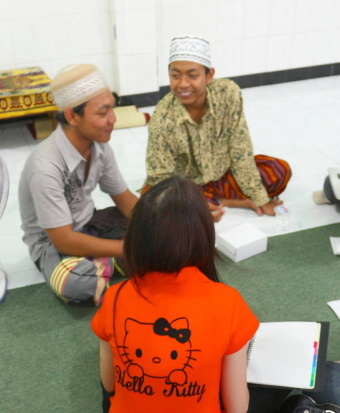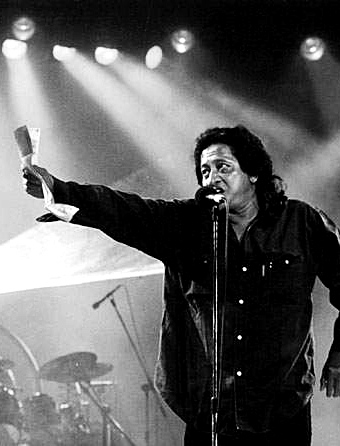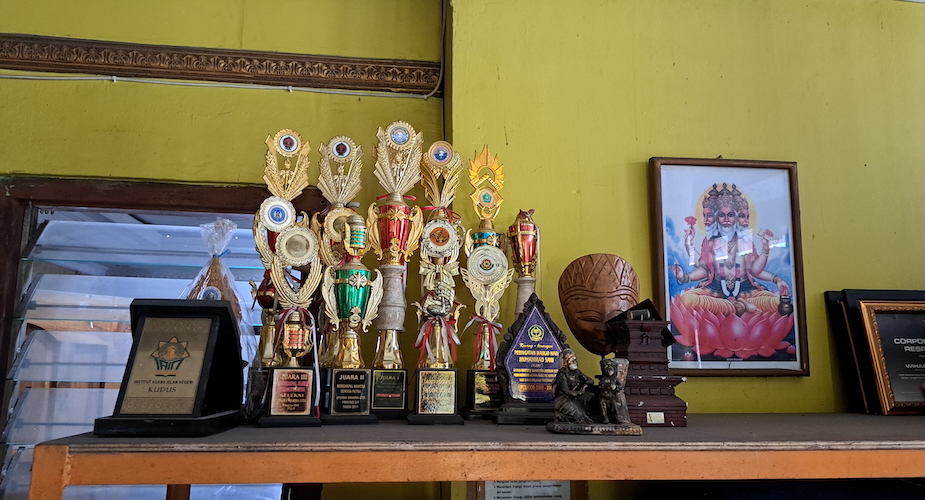Masykuri Bakri doesn’t fit the stereotype for a moderate Muslim leader
Duncan Graham
When hardliners hung banners on the campus of Islamic University Malang (Unisma) promoting militant Islam, the rector, Masykuri Bakri, ordered them ripped down and fundamentalist texts to be thrown out.
‘There’s no room for radicals at Unisma,’ he said. ‘This is a place of harmony.’
For Bakri, interfaith tolerance is serious stuff. He reads the Qu’ran as a book of peace and inclusiveness, not an order to blast infidels. Harmony is a word he loves, but seems at odds with a stern administrator running a tight academic institution.
His background, upbringing and career to date might have shaped a determined advocate of Indonesia as a syariah state. Instead he wants to break down walls between faiths. He dismisses his critics: ‘I just keep going. That’s my job. I’m not interested in politics, just peace, understanding and respect.’
Bakri stands for more than words. Earlier this year his university hosted the Deklarasi Malang Berdoa, the Malang Declaration of Prayer. This was village-style consensus building – known as musyawarah – on an urban scale.
‘We want Unisma to be an example that others can follow,’ said Bakri who gave a strident speech evoking shared national values and a vision of togetherness that brought frequent outbursts of applause from the 600-strong crowd, showing most were already converted.
The timing was important.
With fears that some regional election candidates would play the religious card in the recent July elections, the event aimed to fend off hate. It didn’t succeed beyond Malang. Days later suicide bombers in Surabaya attacked churches, killing 28 and wounding 50. In Central Sumatra police arrested alleged terrorists linked to Riau University.

Bakri remains undaunted: ‘We’re a multi-faith nation; that has to be our way, now and in the future.’ The Malang prayer was staged by an interfaith committee backed by the Jawa Pos newspaper. Catholic nuns and ethnic Chinese were prominent in the audience. Curiously few Unisma students were present. Bakri said many were busy on other activities.
Unisma is a private university with 13,000 students. It is associated with the mass Islamic movement Nahdlatul Ulama (NU), once led by the late former president Abdurrahman Wahid, known as Gus Dur. During his brief tenure (1999-2001) Wahid scrapped bans on Chinese language, names and faith. Confucianism became a state-approved religion along with Islam, Catholicism, Protestantism, Hinduism and Buddhism. All were represented on the Unisma stage plus kebatinan, the traditional Javanese belief system. The government labels this a cultural practice, refusing requests for higher recognition.
Bakri grew up in a small village outside Tuban on the north Java coast. The city is famous for the sixteenth century grave of Sunan Bonang, one of the nine Walisongo mystics who brought Islam to the archipelago.
‘My parents couldn’t read or speak Indonesian’ he said. ‘We had no electricity. My farmer father was not religious though this was the heartland of Islam. However, I loved going to the mosque. It was the centre of the community. Sometimes we kids slept there after sport and prayer.’
‘My mother was a strong advocate for education and insisted I study. I got so enthusiastic as a child I wrote my name as Professor Doctor Masykuri.’
His learning has been confined to Islamic institutions in Java. At an Islamic boarding school, astronomer and cleric Hahfudz Anwar taught him that science and faith can co-exist. Bakri’s limited formal education perversely adds to his local credibility; he’s shielded from the slur hurled at moderates who have studied overseas – that they have lost touch with their roots and become corrupted by Western values.
He doesn’t have a PhD, doesn’t speak English and resides far from the intellectual hothouses where competing ideas bloom and challenge. His benign philosophy is traditional Javanese Islam forged in villages where survival depends on mutual aid and tolerance. He says his thinking is followed by most of NU’s 40 million members, though often overlooked in the focus on a few extremists.
Bakri has written 18 books. Despite his literary output and claim to be a wide reader, the only Western author Bakri recalled was Karl Marx. He hasn’t opened the Bible and was scheduled for his first church visit in mid June.
Why not before? ‘I’ve never been invited till now.’
He supports the Islam Nusantara (Islam of the Archipelago) movement, which aims to develop ‘Indonesian as well as Islamic society’. Its other goals are ‘improving the welfare of lower classes of society, building democracy and fundamental justice, and expanding peace and non-violence throughout the world’.
‘I’ve always believed spirituality and intellect must be combined to produce positive energy and the right environment,’ Bakri said. ‘Unisma students pray at the start and end of each lecture.’
‘Prayer is like pedalling a bicycle – it helps you reach your goal. Spirituality can be interpreted as a source of motivation, respect for God and each other. We all need this whatever we believe, not confrontation.’
The rector has made short visits abroad to build tertiary institution links in South Korea, Taiwan, Malaysia, Singapore and Australia. Most interest has come from the Islamic Sultanate of Brunei.
‘My dream is to become world class; an international and multicultural university,’ he said. Fine ambition, tough task. The nearby Ma Chung University opened in 2007; with 2000 mostly ethnic Chinese students it’s already ahead of Unisma – born 1981 – on the Unirank website.
The heart of Bakri’s campus is not the library but the mosque. The study of Islam tops the list of 10 faculties.
Orthodox Bakri hasn’t escaped his humble origins but given them provincial status. Going further and drawing from disparate sources could threaten his base. Yet despite the limitations and setbacks his focus remains.
‘I’m very optimistic harmony can and will prevail,’ he said firmly. ‘No doubts.’
Duncan Graham is an Australian journalist living in East Java. He writes the blog Indonesia Now.

